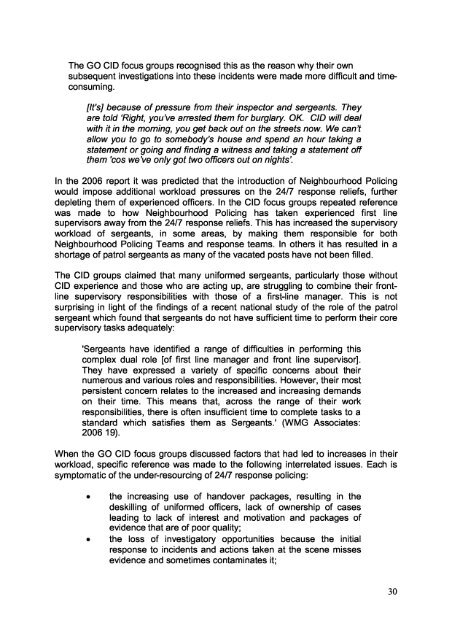LOSING THE DETECTIVES: VIEWS FROM THE ... - Police Federation
LOSING THE DETECTIVES: VIEWS FROM THE ... - Police Federation
LOSING THE DETECTIVES: VIEWS FROM THE ... - Police Federation
Create successful ePaper yourself
Turn your PDF publications into a flip-book with our unique Google optimized e-Paper software.
The GO CID focus groups recognised this as the reason why their own<br />
subsequent investigations into these incidents were made more difficult and timeconsuming.<br />
[It's] because of pressure from their inspector and sergeants. They<br />
are told ‘Right, you’ve arrested them for burglary. OK. CID will deal<br />
with it in the morning, you get back out on the streets now. We can’t<br />
allow you to go to somebody’s house and spend an hour taking a<br />
statement or going and finding a witness and taking a statement off<br />
them 'cos we’ve only got two officers out on nights’.<br />
In the 2006 report it was predicted that the introduction of Neighbourhood Policing<br />
would impose additional workload pressures on the 24/7 response reliefs, further<br />
depleting them of experienced officers. In the CID focus groups repeated reference<br />
was made to how Neighbourhood Policing has taken experienced first line<br />
supervisors away from the 24/7 response reliefs. This has increased the supervisory<br />
workload of sergeants, in some areas, by making them responsible for both<br />
Neighbourhood Policing Teams and response teams. In others it has resulted in a<br />
shortage of patrol sergeants as many of the vacated posts have not been filled.<br />
The CID groups claimed that many uniformed sergeants, particularly those without<br />
CID experience and those who are acting up, are struggling to combine their frontline<br />
supervisory responsibilities with those of a first-line manager. This is not<br />
surprising in light of the findings of a recent national study of the role of the patrol<br />
sergeant which found that sergeants do not have sufficient time to perform their core<br />
supervisory tasks adequately:<br />
'Sergeants have identified a range of difficulties in performing this<br />
complex dual role [of first line manager and front line supervisor].<br />
They have expressed a variety of specific concerns about their<br />
numerous and various roles and responsibilities. However, their most<br />
persistent concern relates to the increased and increasing demands<br />
on their time. This means that, across the range of their work<br />
responsibilities, there is often insufficient time to complete tasks to a<br />
standard which satisfies them as Sergeants.' (WMG Associates:<br />
2006 19).<br />
When the GO CID focus groups discussed factors that had led to increases in their<br />
workload, specific reference was made to the following interrelated issues. Each is<br />
symptomatic of the under-resourcing of 24/7 response policing:<br />
• the increasing use of handover packages, resulting in the<br />
deskilling of uniformed officers, lack of ownership of cases<br />
leading to lack of interest and motivation and packages of<br />
evidence that are of poor quality;<br />
• the loss of investigatory opportunities because the initial<br />
response to incidents and actions taken at the scene misses<br />
evidence and sometimes contaminates it;<br />
30
















